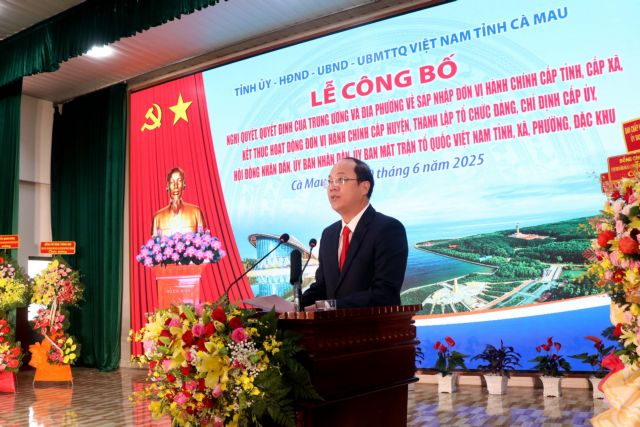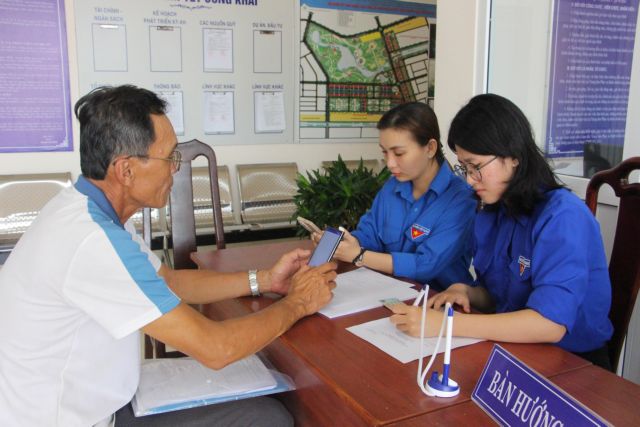 Society
Society


|
| Nguyễn Hồ Hải, secretary of the Cà Mau Province Party Committee, speaks at an event held on June 30 to announce the establishment of the new reorganised Cà Mau Province. – VNA/VNS Photo Kim Há |
In the month since the two-tier local government model was adopted, the southernmost province of Cà Mau has been performing excellently. Secretary of its Party Committee, Nguyễn Hồ Hải, speaks with Vietnam News Agency about the province’s dynamic and creative approach to the new system.
How do you assess the province’s initial results after a month of the two-tier local government model?
Since officially adopting the two-tier local government model, Cà Mau’s political system has operated smoothly and efficiently. It has fulfilled state management functions while serving residents and businesses effectively.
Organisational work was carried out promptly and decisively, in line with the set plan. Staff appointments have been appropriate, ensuring stability.
Province- and commune-level State agencies, Party bodies, the Việt Nam Fatherland Front and socio-political organisations have been established or streamlined for greater efficiency with central guidance.
The provincial public administration service centre has been strengthened, and similar centres have been set up in all communes. Decentralisation and delegation of authority have been implemented in a timely manner, with clear responsibilities assigned to each level and sector. This has improved the quality and efficiency of administrative procedures and public services.
Importantly, the entire political system, officials, Party members, and the public have shown great responsibility and solidarity with Party and State policies. This forms a strong foundation for further improving the model’s effectiveness.
How has the model impacted administrative efficiency and public services?
The two-tier local government model has brought the government closer to the public. It has promoted initiative and strengthened the role, responsibility and administrative capacity of leaders at every level.
Officials have shifted from merely fulfilling administrative duties to actively serving the public. They now focus on addressing difficulties faced by the public and businesses with administrative procedures.
The provincial Party Committee is committed to the principle of putting residents and businesses at the centre, and using their satisfaction as the benchmark to evaluate administrative quality.
The province has established and launched the provincial public administration service centre, along with centres in all 64 communes and wards, which have proven effective.
Infrastructure and equipment have been upgraded, and IT systems are synchronised and functioning well.
Administrative processes have been simplified and abridged, enabling the public and businesses to complete procedures more quickly. This is seen as a breakthrough, transforming the province’s administration towards professionalism, modernity and service.
What major difficulties and challenges has Cà Mau faced in implementing the model, and how has it addressed them?
Despite the early success, several difficulties and challenges remain. Some officials are reluctant to change, and some communes experienced initial confusion in planning and implementation.
Staffing imbalances have affected efficiency. Limited infrastructure at the commune level has occasionally delayed the completion of procedures. The online public service system is sometimes overloaded. The use of scattered, older office buildings has also complicated management.
To address these issues, the province has issued practical plans and directives. Task forces from the provincial Party Committee, People’s Committee and departments have gone to communes to resolve urgent problems.
At the same time the province is training and guiding officials at all levels in using the document management system while reviewing and streamlining the apparatus to ensure clear roles, duties and responsibilities.
It is also strengthening the use of information technology, streamlining administrative procedures and fully implementing policies for affected officials, public employees and workers.
The Party Committee recognises that difficulties and obstacles remain since these are early days. However, with a proactive, open-minded and determined approach, Cà Mau will refine the model to meet sustainable development goals.

|
| Young volunteers from An Xuyên Ward in Cà Mau Province help a local person complete online public administrative procedures. – VNA/VNS Photo Trung Kiên |
How has the province deployed its staff to ensure stability and effectiveness?
Following guidance from the Politburo, Party Secretariat and Party Central Committee’s Organisation Commission, the provincial Party Standing Committee carefully prepared personnel plans by reviewing, classifying and fully assessing officials based on their integrity, professional qualifications, practical ability, and performance.
The province prioritises retaining those with competence, experience and political integrity, and the principle of selecting the right person for each job.
To ensure uninterrupted work at the commune level, provincial officials with appropriate expertise have been deputed to assist. Policies have been implemented for surplus staff affected by restructuring alongside workforce reorganisation.
The Party Committee will continue to improve the administrative performance under the two-tier local government model, with people at the centre and staff development tied to organisational reform.
What key directives will the provincial Party Standing Committee focus on to further improve the political system and enhance the effectiveness of the two-tier local government model?
The Cà Mau Province Party Committee will focus on certain key tasks.
First, it will continue implementing resolutions and conclusions of the Central Government, especially in reorganising the apparatus under the two-tier local government model. The province will streamline its structure, improve personnel quality, ensure proper policies for public employees and armed forces during the reorganisation, arrange facilities, and make efficient use of public resources.
Second, it will organise Party congresses at all levels in accordance with the Politburo’s Directive No. 45-CT/TW of April 2025 on “Party congresses at all levels towards the 14th National Party Congress” along with relevant Central Government instructions and provincial planning.
Third, it will study, disseminate and develop thematic resolutions, programmes and plans to implement resolutions of Party congresses at all levels and the 2025–30 Provincial Party Congress. It will promote patriotic emulation movements in all sectors to welcome the 14th National Party Congress.
Fourth, it will thoroughly implement Party resolutions focusing on the four pillars of science and technology, innovation and digital transformation; international integration; law-making and enforcement; and private sector development. The province will promote decentralisation and sharing of authority between the Government and the two-tier local administration while reviewing all resources and advantages for its development.
Fifth, it will prepare for elections to the National Assembly and People’s Council at all levels for the 2026–31 term, ensuring they are democratic, lawful, safe and economical.
Sixth, it will strengthen administrative discipline, resolutely address avoidance of responsibility and fear of mistakes, and build an ethical, capable and politically steadfast civil service. The province will focus on combating corruption, waste and negativity and efficiently mobilising resources.
What message would you like to send to officials, Party members and the public during this important period of transformation?
At this important transitional stage, I call on every official and Party member to uphold responsibility, solidarity, creativity, and dedication in their work; to continue learning, improve their capacity, adapt to organisational change, maintain ethics, and serve the people; and to place the people at the centre of everything.
Each official and Party member should set an example, take the lead, overcome difficulties, and contribute to the province’s stability and development.
The people should keep their trust in the Party’s leadership and join hands with the authorities to make Cà Mau more prosperous and beautiful. All public opinions, concerns and aspirations will always be heard and addressed promptly, safeguarding their rights and ensuring a better quality of life. – VNS




